According to the latest quarterly forecast for the FM sector from the Building Cost Information Service (BCIS), repair and maintenance output is expected to fall substantially in 2024, by 5.6 per cent compared with 2023.
In 2025, the forecast cites output will “remain static” and then will “slowly and gradually increase again,” with annual growth expected to be 1.4 per cent in 2028.
BCIS Chief Data Officer Karl Horton said: “While the economy was fragile and uncertain in 2023, repair and maintenance showed strong growth compared with new work, with output up 8.3 per cent on the year.
“However, as private householder and the private commercial sector spending falls, and public sector budgets are constrained, we expect to see output fall in this sector too.
“There are, however, encouraging indicators for the facilities management sector, including decreasing inflation and falling energy prices.
“We expect that the activity on energy-efficiency retrofit, cladding remediation and RAAC issues – even if a sizable amount of this may be classified as new work for non-domestic buildings – will push the repair and maintenance output to further growth, at least in the later stage of our forecast period.”
Costs:
Maintenance costs – as measured by the BCIS All-in Maintenance Cost Indices, are set to rise by 19 per cent in the same period to Q4 2028.
Cleaning costs – are forecast to increase by 32 per cent by the end of 2028, with a 9.2 per cent annual increase in Q4 2024 due to factors including labour shortages and increases in the national living wage.
Energy costs – are expected to fall by around 53 per cent by Q4 2028, though the sector is of course vulnerable to ongoing geopolitical movements and global conflict.
Horton added: “While materials cost inflation has cooled considerably and there has been less pressure on availability, there are still concerns about developments in the Middle and Far East, which has the potential to put further pressure on supply and drive up prices.
“The slowing materials cost inflation, however, will be offset by higher inflation wage awards in the first two years of our forecast, with labour costs making up between two-thirds to three-quarters of maintenance costs.
“Although general inflation has decreased, wage awards continue to be influenced by inflation in previous periods and we forecast they will be above the current rate of inflation over the next two years.”





